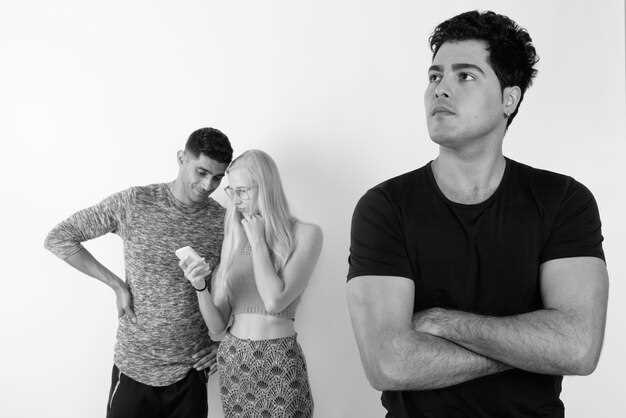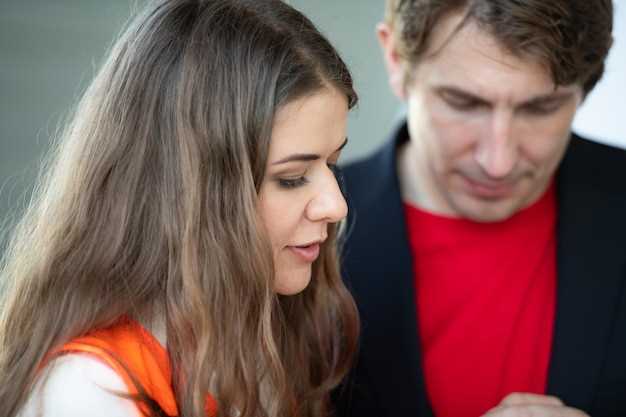Choose measurable criteria for a partner: punctuality, follow-through on promises, emotional availability. Track these across 8–12 meetings or about 3 months; if at least 70% of interactions meet your standards, keep investing time. Life changes matter, so record specific instances (dates, times, what was said) rather than relying on impressions.
When youre talking about priorities, ask targeted questions and measure responses by action. Example: ask “When I need support, how will you respond?” and then observe response within 48 hours after a real request. Small things – responding to texts, showing up for plans, admitting mistakes – reveal trust more reliably than compliments or grand gestures.
Give little tests that are fair and transparent: request help with a task twice in a month, check follow-through on one joint plan, and note emotional availability during conflict. If a person appears engaged but fails to follow through on 2 of 3 actions, that indicates a pattern, not a one-time issue. That pattern predicts longer-term compatibility better than chemistry alone.
Limit talking solely about attraction; evaluate daily habits and values instead. If youre wanting a long-term partner, set clear boundaries about time, communication frequency, and financial expectations within the first 90 days. After you establish these, reassess: keep what aligns, cut what doesn’t.
For practical tools, use a simple spreadsheet with columns: date, behavior observed, rating 1–5, follow-up needed. Subscribe to a local dating newsletter for weekly exercises and data-driven prompts to appear consistent and to identify consistent partners faster.
7 Proven Tips to Attract Mr Right – Find Lasting Love
Be direct when talking: state what you think and believe about priorities, thats how you build trust more quickly than rehearsed lines; show yourself without filters.
Follow up after dates: give clear next steps when momentum exists, and catch signals of interest rather than leaving things to chance.
Invite lightness: laugh at real moments and note small details people like; that helps you appear confident and grounded.
Keep a mysterious edge: having a few unsaid anecdotes about your life encourages another date instead of unloading everything at once.
Polish hair and posture; girls notice small grooming choices, and want authenticity – wanting approval undermines natural chemistry.
While looking for alignment, pay attention to signals this person sends in conversation; subtle consistency beats grand gestures.
Subscribe to a local events newsletter to meet people organically and create structured chances to connect.
Personality Matters: Make Your True Character Visible
Share three short, specific stories in your first two meetings: one that shows values, one that shows resilience, one that shows humor; keep each story under 90 seconds and limit your talking to a 60/40 listening-to-speaking ratio so observation confirms authenticity.
Give concrete facts, not labels: dates, decisions, measurable changes – thats how you appear trustworthy. Never deflect with vague summaries; after two honest disclosures most people report clearer judgment of character.
Start a monthly newsletter of 250–400 words that publishes three items: a recent choice, one small failure and the lesson, and a quirky ritual. Having this public archive makes your character searchable and easier to catch by someone looking for substance.
Allocate 90 minutes per week to refine stories, select three photos that match tone, and schedule two brief calls per month; this time investment (about 6–8 hours monthly) accelerates clarity and helps you leave superficial matches faster.
Use nonverbal trust signals: steady eye contact for 4–6 seconds, a calm cadence, and minimal mirroring. Keep a little mystery – avoid full CVs on first contact – as that mysterious element often makes you appear more sexy to those prioritizing depth.
If youre looking for girls who share priorities, post one example of daily life and one long-term goal; that simple pair makes mutual alignment faster and filters another 30–50% of incompatible prospects within two weeks.
Practice the mirror test weekly: record 60 seconds describing what you believe matters most, then listen and think which phrases make you look authentic; if you catch rehearsed lines, leave them out and replace with a concrete anecdote about yourself, and refine answers when you have 48 hours to edit. When youre asked what should someone know about you, answer with one specific action and one boundary.
Draft a 30‑second personal snapshot to share on dates
Speak three tight beats: identity (8–10s), a concrete anecdote that reveals character (10–12s), and a simple invitation or curiosity-sparking line (8–10s); aim for 45–65 words total.
- Identity – 8–10 seconds: one sentence: job or main focus + one passion. Example: “I’m a product manager who builds small apps and tutors kids on weekends.”
- Anecdote – 10–12 seconds: one specific detail that makes you appear real and a little mysterious: a short scene, data point, or odd hobby. Example: “Last month I fixed an old radio and ended up writing a tiny newsletter about vintage sound.”
- Invitation – 8–10 seconds: a low-pressure close that gives a next move: a question or offer. Example: “If you like weird music, we should swap playlists – what would you add?”
- Word count guide: keep identity to 8–12 words, anecdote 15–25 words, invitation 8–12 words. Total ~45–65 words fits ~30 seconds when spoken at natural pace.
- Delivery: breathe between beats, smile, pause 0.5s after the anecdote; laugh lightly if the anecdote invites it – never force humor.
- Content choices that catch: an unusual skill, a travel snap, a volunteer moment, or a hobby that makes you confident not showy (e.g., “I coach youth soccer” beats “I’m athletic”).
- Style cues: be succinct, avoid long lists of accomplishments, let one thing about yourself appear as the hook; make that thing relatable to everyday life.
- Voice: talk like you’re describing a snapshot to a friend – youre clear, concise, and curious. Use little sensory detail (a smell, a sound, hair in the wind) to make the image stick.
Sample male snapshot (45 words): “I’m a product manager who builds simple tools for creators. Last year I restored a record player and now run a short newsletter about old music discoveries. If youre into hidden tracks, tell me one and well trade favorites sometime.”
Sample female snapshot (50 words): “I teach design and freelance on weekends. I once painted a mural on a cramped cafe wall and the owner still leaves pastries for me – the local goodies scene keeps me curious. Want to walk and point out odd little murals around town?”
- Use words that matter: make trust clear by showing consistency (project + repeatable action), let some mystery remain so youre not fully decoded, and let the other person catch a thread they can pull on.
- During conversation, shorten the snapshot to one-sentence answers and expand only if the other person asks; give them time to react while youre talking.
- Looking confident is more about steady eye contact and calm pacing than being louder; little pauses and genuine laugh signals that youre relaxed.
- Avoid listing qualities like “nice” or “driven”; instead show them through specific actions or outcomes – that matters more than adjectives.
Practice this aloud twice daily for one week while recording; trim filler words until the snapshot lands naturally at ~30 seconds. For structure guidance on short pitches, see Harvard Business Review: https://hbr.org/2017/05/how-to-perfect-your-30-second-elevator-pitch
Pinpoint three core values and give one concrete example for each

Choose honesty, curiosity and consistency; act on each with a single measurable example below.
| Core value | Exemple concret | When to check |
|---|---|---|
| Honnêteté | Admit a scheduling mistake within 24 hours and propose a concrete fix: move the next meeting to a specific date and set a shared calendar invite. | After any missed plan, within 24 hours |
| Curiosity | During a first three dates ask three specific questions about childhood, work and free-time routines and take notes to reference later. | During first month of dating |
| Cohérence | Agree on one weekly ritual (30-minute walk or coffee) and keep it for 12 consecutive weeks; record attendance and reasons for any skipped session. | Weekly, review every 4 weeks |
For honesty: having a clear follow-up shows youre confident enough to own mistakes; thats the thing that builds trust faster than smooth excuses. When you admit an error and give a fix, some girls will believe youre reliable; after that, little actions like returning calls on time matter in everyday life.
For curiosity: appear engaged while talking – ask “what surprised you most about that job?” or “who taught you to style your hair?” Use concrete follow-ups so the other person feels heard; youll catch details to reference later and give them reason to laugh and open up during conversations.
For consistency: pick one small commitment you can keep and leave room for honest feedback. If youre looking mysterious sometimes, balance it by showing up the next scheduled time; that little proof over time trumps promises. Subscribe to a short newsletter or shared playlist to keep continuity without forcing weekly check-ins.
Practice these examples for three months, track dates on a calendar, and believe the data: regular, concrete actions matter more than vague intentions.
Use specific anecdotes to show humor and warmth
Use a 20–30 second anecdote about a small mishap during a first meeting: state the scene, describe the cue that went wrong, then deliver a self-deprecating punchline that makes people smile; you should keep the whole story under 30 seconds.
Structure the story as set-up, twist, payoff: one sentence for each, include two sensory details, one direct quote and a callback later in conversation. After you tell it, pause 2–4 seconds so laughter can settle. Some believe polished reels hide things; think of the anecdote as a little window into one simple thing – how you behave under pressure – and many ladies, when looking for warmth, notice that candid response. People catch authenticity, not staged perfection.
Sample line to practice: “I spilled coffee on a book and pretended it was an avant‑garde annotation; she laughed and we both inspected the new stain.” Deliver with a confident, slightly mysterious smile, look into the other person’s eyes for 2–3 seconds, then talk about a follow-up detail. Make sure youre not apologetic; trust yourself to give some humor and warmth that shows what matters to you when youre with someone.
Practice active listening prompts to let your personality shine
Use three micro-prompts per conversation: within the first 90 seconds ask a clarifying question (“What happened next?”), then mirror emotion with a short phrase (“That sounds exciting”) and finish a turn by inviting detail (“Tell me one tiny thing you noticed”). Aim for a 60/40 listening-to-speaking ratio and keep each follow-up under 12 seconds so youre not dominating time. If youre talking too much, stop after two sentences and ask a direct prompt – thats the fastest correction to avoid rambling.
Nonverbal practice: hold eye contact about 50–70% of the time, nod twice every 10–15 seconds, and adopt a 1.5-second mirroring delay of posture. Notice small cues like tucked hair or a laugh; a specific compliment (“Your hair looks great”) feels less scripted and makes the other person relax. Subtle mystery works better than oversharing: leave one detail slightly mysterious and youll have them wanting to catch up after the chat. In mixed groups, little gestures often make girls laugh and look back, which matters more than flashy lines.
Daily drills: spend 10 minutes a day practicing three prompt sets on a friend or in front of a camera, record two sessions per week, and reduce filler words by 30% after two weeks. Treat each practiced prompt as a little goodie youll deploy naturally – log which prompts get the best reactions and rotate them. Subscribe to a focused newsletter for fresh conversation starters if you want more examples, but measure progress by how often people ask follow-up questions after talking with you; if that rate rises by 25% in a month, you should believe the method works and keep refining the ones that make conversations feel sexy, genuine and more like real life.
Brains: Demonstrate Intelligence Without Bragging
Cite one precise fact and one short application when you talk: name the source and year, then give a single sentence that shows how that fact solves a real thing someone might want.
- Have a card of three go-to examples so you can switch to concrete evidence without dominating the exchange; having these ready makes you appear prepared, not showy.
- While listening, paraphrase one key point back and ask one clarifying question – never more than two follow-ups; this builds trust faster than long monologues.
- Give little freebies or goodies: a book title, one article link, or your newsletter sign-up; this positions you as generous rather than boastful.
- Use relatable scales: compare a micro detail to a hair (a human hair ≈100 µm) to catch attention with concrete numbers rather than vague claims.
- Prefer short stories: one anecdote under 90 seconds that includes a problem, action, result; girls and ladies often remember the result more than technical depth.
- When you disagree, say “I think another angle is…” rather than “You’re wrong”; that phrasing keeps the room curious and keeps you confident without arrogance.
- Reduce jargon: replace technical words with a single everyday metaphor; this helps people follow and makes your point stick.
- Limit examples to three per conversation; more examples give diminishing returns and make you appear eager to prove rather than to share.
- Never interrupt to correct a minor detail; note it and bring it up later in private if it matters – leaving public space respectful increases perceived intelligence.
Practice two brief framing lines you can use during introductions: one that states your focus, another that states a practical outcome. This little structure gives you clarity, helps girls and guys catch what you want to communicate, and makes your expertise usable for others.
Present yourself as curious: ask what they read recently, what problem they want solved, or which hobby they pick up next. That approach makes you appear confident and approachable, rather than trying to impress.


 7 Conseils Avérés pour Attirer M. Parfait | Trouvez un Amour Durable">
7 Conseils Avérés pour Attirer M. Parfait | Trouvez un Amour Durable">

 12 choses que les femmes n'apprécient pas chez les hommes – Ce que les hommes devraient savoir">
12 choses que les femmes n'apprécient pas chez les hommes – Ce que les hommes devraient savoir">
 Conseils de Relation – Perdez-vous votre temps avec la mauvaise personne">
Conseils de Relation – Perdez-vous votre temps avec la mauvaise personne">
 Trouvez la paix et l'harmonie dans les relations grâce à des solutions mutuelles | Conseils pratiques">
Trouvez la paix et l'harmonie dans les relations grâce à des solutions mutuelles | Conseils pratiques">
 Second Time’s a Charm – Second Marriage After Divorce — How to Make It Work">
Second Time’s a Charm – Second Marriage After Divorce — How to Make It Work">
 Crise nuptiale qui a renforcé mon mariage – Leçons et croissance">
Crise nuptiale qui a renforcé mon mariage – Leçons et croissance">
 Signes d'un manque de lien émotionnel dans une relation">
Signes d'un manque de lien émotionnel dans une relation">
 Signes de déconnexion émotionnelle dans les relations — Comment reconnaître un manque de connexion émotionnelle">
Signes de déconnexion émotionnelle dans les relations — Comment reconnaître un manque de connexion émotionnelle">
 Comment Communiquer Avec Amour Quand on Est Fâché — Conseils Apaisants">
Comment Communiquer Avec Amour Quand on Est Fâché — Conseils Apaisants">
 Parents séparés – 6 façons de montrer à votre enfant que vous l’aimez">
Parents séparés – 6 façons de montrer à votre enfant que vous l’aimez">
 How Long to Wait After a Breakup Before Dating Again">
How Long to Wait After a Breakup Before Dating Again">